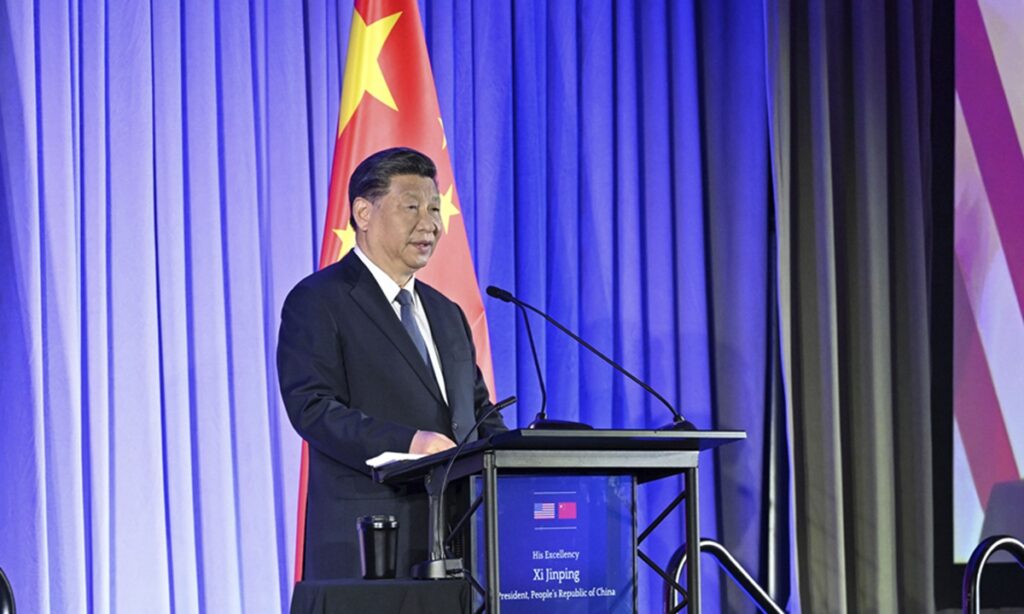Experts said those interactions can help consolidate guardrails of China-US relations, and help form a driving force that may lead to more cooperation between the two countries, thus will be conducive to stabilizing an unpredictable bilateral relationship. Whether the world’s most important bilateral ties can be less tumultuous in 2024 than this year, it depends on Washington’s ability to avoid spillover effects of US domestic politics, such as the presidential election, and both countries’ willingness, as well as ability to solve specific issues troubling bilateral relations and expand areas of cooperation, said experts.
The Chinese Embassy in the US held an event recently to commemorate the 52nd anniversary of Ping-Pong Diplomacy. The Peking University table tennis team was invited to attend the commemorating events in Washington and San Francisco. The team has also participated in the 2023 USATT Table Tennis Open Championships at the Ontario Convention Center in California, the Xinhua News Agency reported on December 18.
“What impressed me the most is the huge interest and enthusiasm the American youth showed during our visit to the US this time,” Zhang Yuwen, a student from the Peking University table tennis team, told the Global Times. “Every time the Americans saw the name ‘China’ marked on our jerseys, they would come to ask where in China we come from; which games we play, and even wish us good luck in our games.”
“We saw great examples of how people-to-people ties and educational and cultural exchanges can overcome political and ideological differences during the summer of 2023 at our Invention Convention China (ICC) Finals event held in Zhengzhou, Henan Province,” Adam Foster, president of the Helen Foster Snow Foundation in the US, told the Global Times.
The ICC is one of the largest invention educational activities in the world. Every year, more than 140,000 students from around the globe take part. The Helen Foster Snow Foundation has been supporting ICC China for a long time, which has since become an opportunity to promote non-governmental educational exchanges.
“In today’s tense US-China political climate, sometimes harsh rhetoric and dehumanizing language is used. We hope that people on both sides can contend peacefully to defend their legitimate interests and viewpoints while remembering that the people of the two countries have so much in common,” said Foster, hoping that people-to-people exchanges can help to ease tensions and remind both sides of the long list of things they have in common.
Chinese President Xi Jinping said at a welcome dinner by friendly organizations after the San Francisco summit in the US last month that China is ready to invite 50,000 young Americans to China on exchange and study programs in the next five years to increase exchanges between the two peoples, especially between the youth.
Xi also said Pandas have long been envoys of friendship between the Chinese and American peoples and China is ready to continue the cooperation with the US on panda conservation.
The US would welcome back any giant pandas China decides to send, the White House said right after Xi’s remarks.
The importance of non-governmental exchange can never be underestimated as it serves as important channel for both sides to form objective and true understanding about each other, and it will help prevent misunderstanding and misjudgment between the two countries, Li Haidong, a professor at the China Foreign Affairs University, told the Global Times.
In August this year, Xi replied to a letter from the US-China Youth and Student Exchange Association and friendly personages from all walks of life in the US state of Washington.
The association helped facilitate the visit of 118 students and teachers from Lincoln High School in Tacoma of Washington State to visit China in 2016. David Chong, founder and president of the US-China Youth and Student Exchange Association, told the Global Times that back then some parents had little understanding of China thus they were concerned about their children’s visit. However, the students came back informed the parents the true picture of China, and helped the latter form an objective impression of China.
Afterwards, many schools in Washington State also started summer camps to China, and many parents decided to bring their children to China during summer vacations, said Chong.
“It is essential to encourage comprehensive exchanges and cooperation between the youth and students of both countries. It is particularly important to enable young people from both countries to understand each other’s culture and values, especially after the pandemic,” said Chong, noting that his association is preparing for more exchange programs with US schools and youth organizations and is working to help realize 50,000 young Americans’ visits to China in the next few years.
Necessary interactions
The interactions between China and the US this year have reached a new level, the highest in at least the past five years, Wu Xinbo, director of the Center for American Studies at Fudan University, told the Global Times on Sunday, referring to not only frequent high-level officials’ visits, but also consultation on issues including trade, drug control and climate change.
Liu Zhenli, a Central Military Commission (CMC) member and the chief of the CMC’s Joint Staff Department, on Thursday held a video teleconference with CQ Brown, Chairman of the Joint Chiefs of Staff of the US, at the latter’s request.
During San Francisco summit meeting, China and the US also agreed to establish a working group on counternarcotics cooperation.
Chinese Ministry of Foreign Affairs Spokesperson Wang Wenbin commented that counternarcotics authorities of China and the US are resuming regular communication. Recently, China has been engaged in campaigns against fentanyl and its precursor chemicals, and cracked down on illegal and criminal activities involving the smuggling, illicit manufacturing, trafficking and abuse of fentanyl-related substances, said Wang.
The US also lifted sanctions on “Drug Analysis Division I, National Narcotics Laboratory” last month by removing it from the “Commerce Entity List”
Hua Zhendong, director of the lab, said his lab has undertaken a significant amount of technical work, including monitoring the illegal production and trafficking of fentanyl, defining the classification of fentanyl-like substances, and establishing sentencing standards for relevant varieties. He said he hoped the US will not do anything to sabotage the drug cooperation between the two countries again.
Before the COP28 meeting in Dubai, China and the US jointly released Sunnyland climate agreement in mid-November. The Chinese and American teams have worked together to support the success of COP28, which was also one of the goals of the previous joint climate statement between the two countries, Xie Zhenhua, China’s special envoy for climate change affairs, said at a press conference along with US Special Presidential Envoy for Climate John Kerry.
Interactions on those areas suggest that both countries are sincere about achieving concrete results in specific collaborations, experts said, therefore, joint cooperations on those areas aim to further strengthen general cooperation between the two sides and, where possible, facilitate cooperation in other areas that are difficult to cooperate on, said Li, noting that those interactions are very helpful for maintaining stability and long-term development of the China-US relationship.
Looking forward, Wu said that the successful holding of the San Francisco summit, where a series of important consensuses were reached, has become a highlight of China-US relations in recent years, or could be seen as a new starting point for China-US relations.
“While the summit meeting in San Francisco has helped to stabilize China-US relations, the question now is whether we can move forward. Can we resolve specific issues disrupting bilateral relations and expand areas of cooperation? I believe this is possible, so next year’s China-US relations are likely to show a distinct dual nature,” said Wu. Particularly noteworthy is next year’s US election.
Next year’s China-US relations are expected to stabilize, said Li, explaining that the effect to stabilize the relations brought about by the intensive interactions between China and the US in the second half of this year will continue into next year.
Moreover, although the US may adopt an unfriendly rhetoric towards China during next year’s presidential election, it will be difficult for Washington to roll out new policies in an election year, said Li, noting that the negative spillover effects of domestic politics in the US on China-US relations will be especially important to watch.




